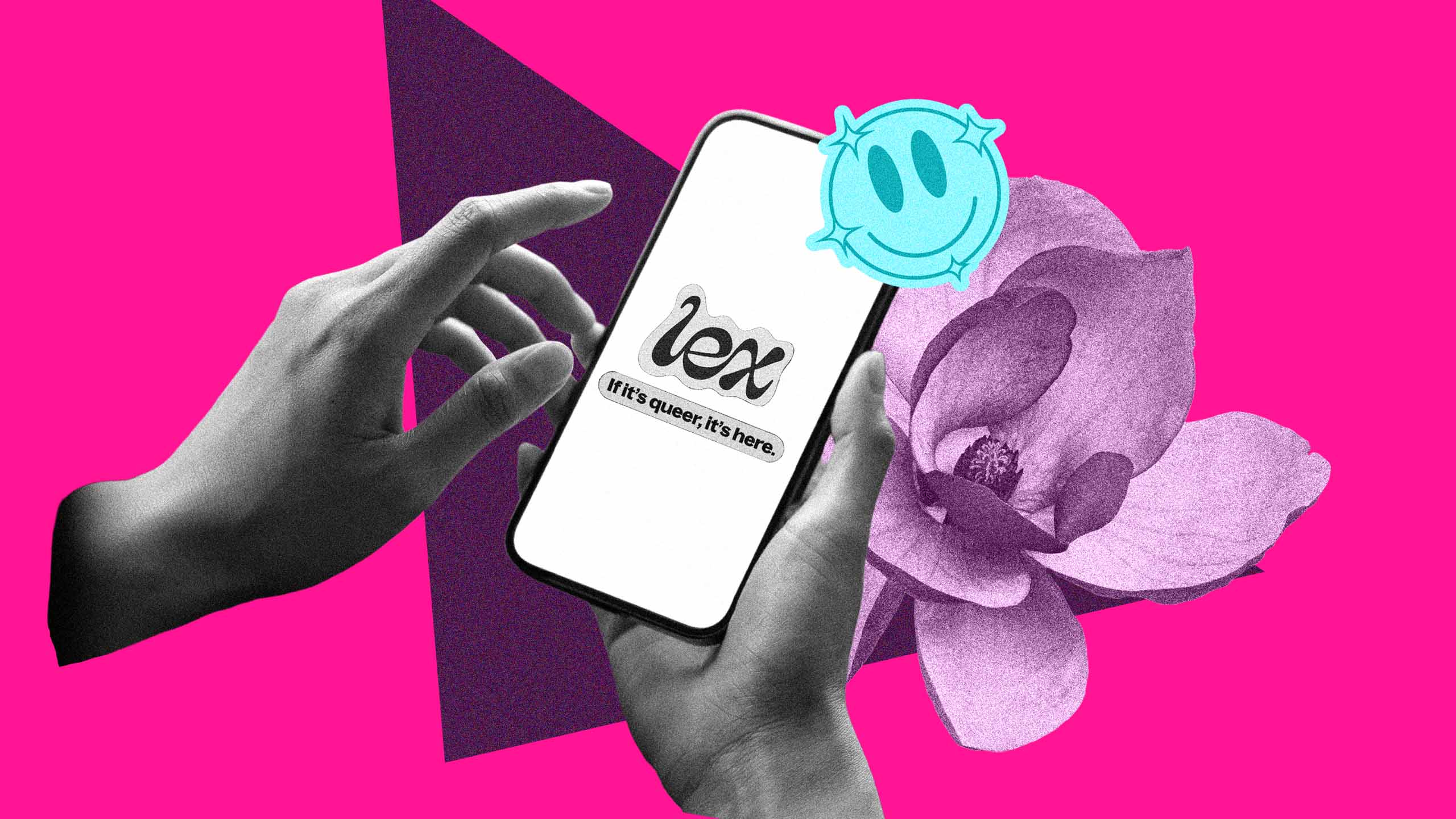Can an app built by and for queer people find mass market appeal—and, more important, seed investor funding—without betraying its users? With their recent redesign, the queer app Lex hopes to do both. To get there, they’re shifting their focus from fisting to friendship.
For those unfamiliar, Lex (short for Lexicon) is a queer-focused, low-fi app with a format inspired by newspaper and magazine personal ads. Lex started as @h_e_r_s_t_o_r_y, an Instagram page dedicated to chronicling queer (and more specifically, dyke) history. While researching magazines like On Our Backs, an iconic 1980s lesbian erotica magazine, founder Kel Rakowski was inspired by the (often explicit) personals written by queer women in San Francisco, and encouraged her followers to DM her their looking-fors and missed connections to be posted on the subpage @_personals_.
The subpage exploded in popularity, and not long after, Lex launched a successful Kickstarter campaign allowing them to develop a fully fledged dating app in November 2019. Lex initially set itself apart from its competitors with its text-only platform; users weren’t able to upload photos, allowing for a dating and hookup experience that leaned more on emotional connection and shared desires than physical appearance. Rakowski referred to the concept as “slow dating.”
After an initial round of pre-seed investor funding in 2020, the app evolved again, this time beyond its bare-bones origins; implementing UX features like reactions, and even allowing profile pictures (though many users prefer to stay photo-free).
Then, on Jan. 26, Lex unveiled a full rebrand that was months in the making: the newspaper-style grittiness of their iconic personals section had been smoothed out into a distinctly cuter layout featuring sans serif fonts and friendly, G-rated cartoon emojis like smiley faces, shooting stars and rainbows. The change wasn’t only aesthetic; along with the makeover, &Walsh, the creative agency behind the rebrand, explained in a press release that “Lex came to us for a rebrand to help them move from being perceived as a queer space for romantic relationships toward a queer space for platonic relationships.”
A recent meme on Lex’s instagram page advertising its rebrand compares two examples of queer personals, positioned as “before” and “after” photos. The before side features raunchy personals like “Have Dildo Will Travel,” and “Fist Starved Cunt;” the after image advertises a platonic t4t tea party. The post, captioned “welcome to the modern age,” rings a little too true—and even a little threatening—in an online era where queer sexuality is scrubbed out of every corner.
The thing is, calling the old Lex a space for romantic relationships doesn’t really do it (or its influences) justice. While it has been the catalyst for many romantic relationships (often catalogued on Instagram under the caption #metonlex), many users—and particularly those who were there for its inception—know the app as a pro-sex, pro-kink cruising space, where queers post about getting fisted, fucked and spat on without fear of censorship or persecution.
Many of these users feel Lex’s pivot is abandoning its core audience. Within hours of the rebranded product release, hundreds of people flocked to the brand’s social media—and even to the Lex platform itself—to express their frustration and betrayal. Many users feel that the redesign infantilizes queer communities, and prioritizes platonic friendships over sexual relationships.
Some even expressed fear that this was the beginning of a larger attempt to desexualize the platform: Instagram user @butch4butches commented underneath the redesign’s announcement, “So when is the ban on sexual content coming? Because that seems to be the direction you’re headed.”
In response to the backlash, Lex posted several Instagram stories on Jan. 30, explaining that the decision to move away from an explicitly sexual/romantic platform was made after polling 4,500 members of their user base. The survey revealed that the “overwhelming majority” of users were using Lex to “find queer community and friendship” and that, while sexually explicit posts were still allowed on the platform, this pivot more accurately reflected their user base. In an email sent out to registered users earlier this month, Rakowski reiterated this message: “[the] community has evolved and with that it’s time for Lex to evolve too,” she wrote. Despite their confidence, the continued backlash was strong enough for Lex to disable comments on their Instagram page.
This isn’t Lex’s first brush with controversy; the original Personals Instagram page came under fire for racism in 2019, and despite community guidelines condemning transphobia, posts with language like “afab only” are frequent on the app. So common are offensive posts that new pages have been created specifically to chronicle them, including @worstoflex—which has seen its follower count go from just over 600 to almost 2,000 since the app’s rebrand, likely due to users looking for an outlet for their displeasure with the changes. The account holder, who wishes to remain anonymous, expressed similar frustration. “For many of us,” @worstoflex told me over email, “Lex felt like one of the only queer hookup apps not dominated by cis gay men—who absolutely deserve the same kind of access to sexual expression—but for whom casual sex is often easier to access.”
The @worstoflex account admin believes the backlash to the changes comes from a place of disappointment. “It’s incredibly frustrating to feel like there is this inevitable end to any attempts by dykes and trans people to forge cruising cultures,” they say.
Digital and physical spaces that allow (let alone encourage) explicit queer sexuality are dwindling. Back in the ’80s and ’90s, there were upward of 200 lesbian bars in the United States. Now, there are 24. Online spaces have not been able to fill the void: since SESTA-FOSTA passed in 2018, multiple major online platforms where queers once expressed their sexualities have been decimated. Craigslist’s personals section—once a popular digital cruising spot—was deemed too “dangerous” to remain online due to panic around solicitation and sex work. Tumblr, once a mecca for queer porn, banned all explicit content. It has since come under fire for over-moderating queer sexuality in particular—as have Instagram, Twitter and almost every other social media platform in existence.
“Without speculating beyond what is appropriate, it is worth noting that Lex is primed to enter into its first round of official seed funding.”
It is a common business practice for platforms and technologies to appeal to an adult audience long enough to build a viable brand, then attempt to abandon this market when they become eligible for a more mainstream funding stream. Appealing to a generalized (and credit card company friendly) audience allows access to larger pools of investment. OnlyFans went this route when they attempted to ban explicit content in 2021, a threat that was quickly reneged after significant backlash. Without speculating beyond what is appropriate, it is worth noting that Lex is primed to enter into its first round of official seed funding. One of its major pre-seed investors is Bumble, another dating app and one of Lex’s competitors.
Nothing is inherently wrong with an app that centres platonic queer community; but we’ve been here before. Even if Lex never bans sexual content outright, the brand’s new aesthetics and vision make it clear: the company is looking to distance themselves—as far as possible– from the unapologetically horny queers who built and funded the app in the first place. Lex is no longer “for lovers” as it once proudly defined itself; instead it is for “community,” a broad term that avoids accountability to anything (or anyone) in particular. Personally, I’m tired of safe, sterile queerness and the surgical removal of sex from homosexuality. I want ad agencies to read about people getting arrested while fucking in bathrooms before telling me that queerness is smiley faces and rainbows and picnics. I want the investors pumping money into Lex’s rebrand to hold queer in their mouth and taste its history as a slur before they try to wipe it down and sell it back to me.


 Why you can trust Xtra
Why you can trust Xtra


